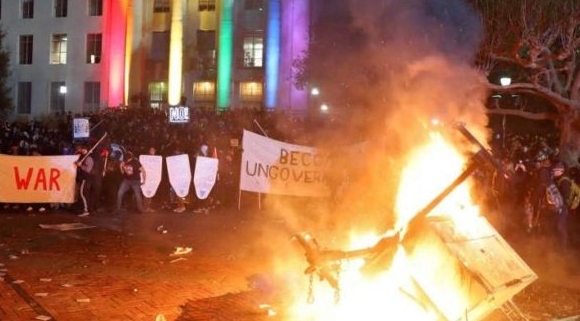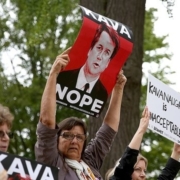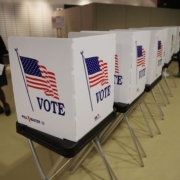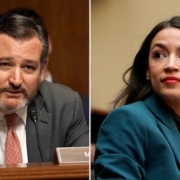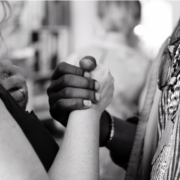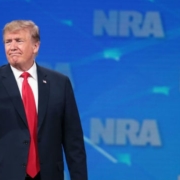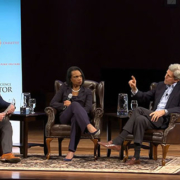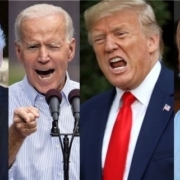“Honor Bush’s legacy by forgoing tribalism”
Common Ground Committee co-founder, Bruce Bond, shares and memorializes the late President George H.W. Bush by urging readers to honor his legacy by forgoing tribalism and support candidates who do the same through civility and common ground methods.
President George H.W. Bush could have chosen to “spike the football.” It was 1991, and the Berlin Wall had fallen. I remember feeling, like so many Americans, elation. The United States had won, and the world seemed to be a safer place. But instead of taking a boastful tone to mark what would be the end of the Cold War, Bush kept a low profile and let the German people do the celebrating.
Instead of claiming victory, he worked with Soviet leader Mikhail Gorbachev, helping to secure a peaceful transition after decades of tension between the two superpowers.
I didn’t know President Bush. The closest I came to him and his family was riding on the school bus with his sons Jeb, Neil and Marvin when I lived in Houston. But his decisions and actions in one of the most critical times of our country told me everything I needed to know about the man.
As the country celebrates the life of our 41st president, many are wondering how to best honor his legacy. I’d say it begins with each of us, citizens and leaders, refusing to participate in the destructive tribalism that has dominated our politics in recent years.
That tribalism is hardly news. We see it every day from both sides of the aisle. In Texas, supporters of Sen. Ted Cruz at a rally personally attacked his opponent, Beto O’Rourke, for his physical appearance. O’Rourke’s fans returned the favor…
The country is taking notice. Only 38 percent of Americans say the United States is heading in the right direction, and an annual poll tracking discourse shows 93 percent say America has a civility problem. During the course of his presidency, Bush frequently represented our better instincts as a nation when it came to how we engaged in our politics.
To be sure, Bush had his moments of bitter partisanship. The infamous 1988 Willie Horton campaign ad is still viewed as one of the lowest moments in modern politics. But more often than not, he chose country over party. There was no greater example of that than during his campaign for re-election. Bush famously promised no new taxes before he took office, a message that appealed to his conservative base. But in 1990, facing the prospects of a government shutdown, he struck a deal with congressional Democrats that ultimately raised taxes.
Bush himself would say that cost him the election, but he did it for the good of the country. He wrote in his memoir, “…when you’re faced with the reality, the practical reality of shutting down the government or dealing with a hostile Congress, you get something done.”
As the nation faces the reality of a divided government after the midterms, the new Congress would be wise to heed Bush’s words. If politicians truly want to honor his legacy, they should do so by following his inclination to work with and respect the other side, even if it’s not politically expedient. That doesn’t mean sacrificing core values for the sake of compromise. It does mean having the determination to work with political opponents to make progress on the tough issues.
In praising his former boss, Vice President Dan Quayle told Fox News that a divided government can work “if you reach across the aisle and work hard.”
We’ve seen examples of this over recent years.
U.S. Sens. John McCain and Russ Feingold joined forces in regulating the financing of political campaigns. More recently, Ohio politicians reached across party lines to create the Congressional Civility Caucus. Politicians like Donna Brazile, Michael Steele, John Sununu, and Barney Frank took part in public forums hosted by the Common Ground Committee, an organization I co-founded that inspires action on polarizing issues by bringing prominent leaders with opposing views together to find common ground.
But we can’t remove the rancor and polarization that plague our halls of leadership unless each citizen decides that rewarding that behavior with a vote on Election Day is no longer acceptable. As the 2020 presidential election ramps up, every American should keep George H.W. Bush in mind when they go to the polls. Which candidate has the qualifications and strength of conviction to put politics aside and do what’s best for the country? Who has the decency, grace and kindness that our 41st president demonstrated throughout decades of public life? Whoever best demonstrates those qualities, put party aside, and vote for that person.
President Bush’s passing has brought about a temporary return to civility, as leaders from both sides of the aisle have come out to rightly praise his dignity as a leader. We’ll be doing him a disservice if we once again return to the toxic partisanship that divides rather than unites. I’m confident we can continue his legacy if we, as citizens, resolve ourselves to support politicians who prioritize country over party so that our leaders can move out of the polarization rut and more consistently make the choice to work toward common goals. George H.W. Bush set the example. Now, let’s all follow it.
— This article was published in the Houston Chronicle on December 5, 2018

